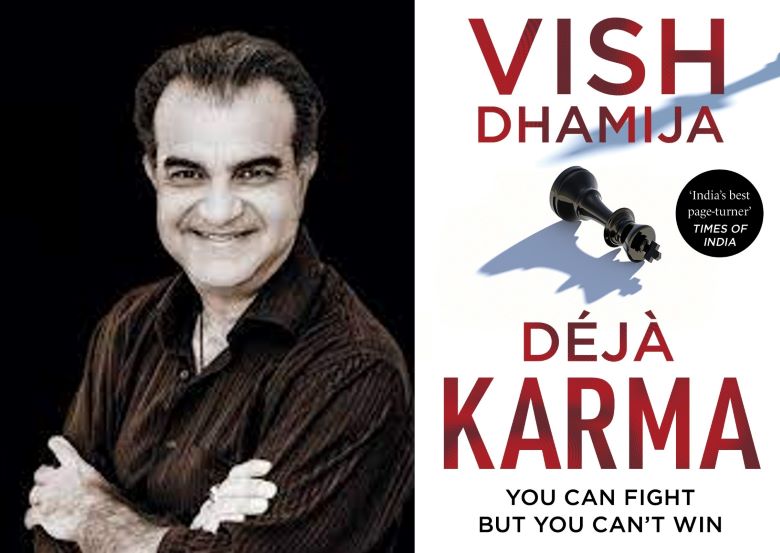Vish Dhamija’s new book ‘Deja Karma’ revolves around philosophy of Karma

Team L&M
Crime fiction write Vish Dhamija is is back with an edge-of-the-seat crime thriller, Déjà Karma (Pan Macmillan India). The book released early this month. The London-based author has 11 crime fiction novels to his credit. Déjà Karma revolves the philosophy of Karma. The story revolves around Jai Singh, a noted criminal lawyer of the city, who has his own way to win the cases he gets. How life unfolds for him is what you will see in the book. Excerpts from the book (page 5-7)
The black Audi Slowed Down.
The chauffeur, Bhīma, certainly wasn’t comfortable driving through this sea of traffic with chaotic waves of pedestrians, cycles, rickshaws, two-wheelers and various makes of cheap, derelict cars. Despite being in his air-conditioned enclosure, the sounds from the street were loud and the stench from the open sewage overpowered the expensive deodorant in the car’s ventilation system. The shops on either side of the road were completely rundown – broken signages, shattered windows; gaudy lighting and glaring displays put up to conceal the dilapidated exteriors. Some were even boarded up, and the homeless day labourers were settling in on those storefronts for an early night. An unbroken string of hawkers on trolleys and carts stood outside the shops, blocking access to them, but no one here sold anything of interest to the passenger, or even the chauffeur for that matter. The Audi, in these surroundings, was itself as out of place as a camel marching in a zebra suit. People turned to see if the car accommodated some celebrity – a film star, a singer, a cricketer – but the darkened windows disallowed it. They assumed it would be some VIP and moved on.
‘Stop anywhere after that white building on the left,’ said the sahib from the back seat, pointing at the building in the next block.
‘Jee, hukum,’ Bhīma replied.
The car turned left into a side road and stopped. Bhīma got out. He was wearing a suit. Summer, winter, autumn, spring, morning, noon, evening or night, Bhīma always wore a suit; it was part of his uniform. More importantly, in deference to his boss’s safety, he kept a licenced handgun – a Colt Anaconda .44 Magnum – concealed inside his suit jacket. As with others like him, there were more firearms that Jay Singh owned, but this handgun was the only one that the authorities knew of. Bhīma looked around, his sharp eyes darting like a fox’s to canvass the area around the car. Built like a small mountain, he could well have been a reincarnation of the legendary Bhīma from the Mahabharata or a cousin of the modern-day Khali of WWE fame. At six feet eleven inches and weighing over 170 kilos, he towered over everyone and everything, especially his boss, who stood at a mere five-foot-seven. He was Jay Singh’s chauffeur- cum-bodyguard-cum-valet-cum-man Friday, and as loyal to his ‘hukum’ as a thoroughbred St Bernard. Truth is, no one makes such devoted friends in life without eliciting fierce animosity in others. Sometimes you create enemies that stay enemies till they croak. Or you do. An armistice is simply out of the question. Of course, some of Jay’s arch enemies had attempted to do what they themselves couldn’t achieve with Bhīma around: persuade and bribe him, but it wasn’t money that got his loyalty. It was a deep-rooted debt of gratitude that – despite Jay treating him as a close friend – led the latter to revere his master as no lesser than a god. The alliance, the bond was simply unfaltering, and the fidelity absolute and indefatigable.
Once sure of the security details, Bhīma got out to open the rear door for the sahib, who offered an almost imperceptible nod of approval and walked towards the white building – a hospital. Just before entering, Jay put a hand in his jacket’s inner pocket and speed-dialled Bhīma’s cell from his spare phone. This covert call would continue till he returned within Bhīma’s field of sight. This was standard operating procedure. Bhīma would attentively listen to all communication on his car radio – a passer-by could be forgiven for thinking that he was listening to the audio version of George Orwell’s Animal Farm – and would react within seconds, in case his boss was in trouble of any sort.

